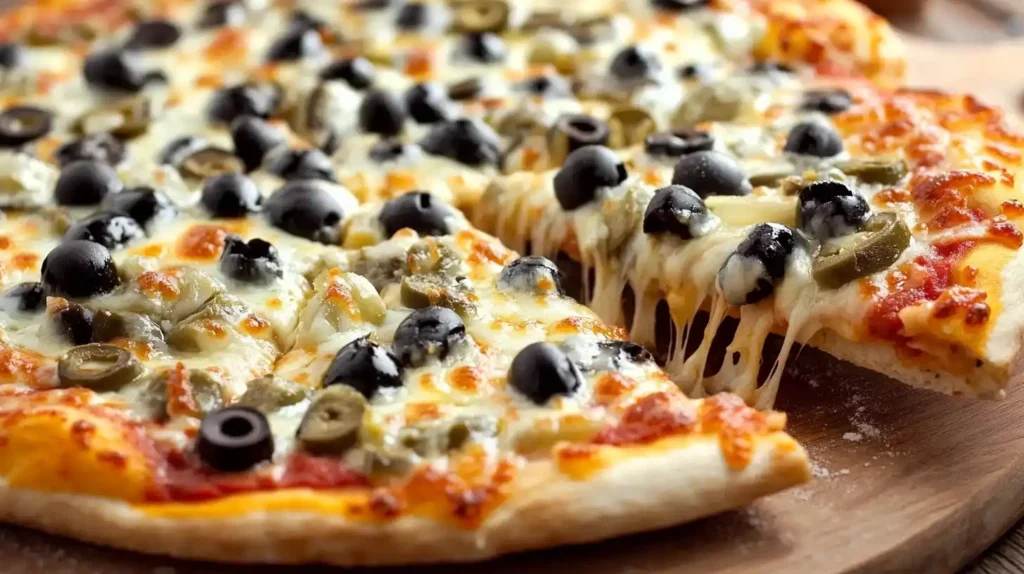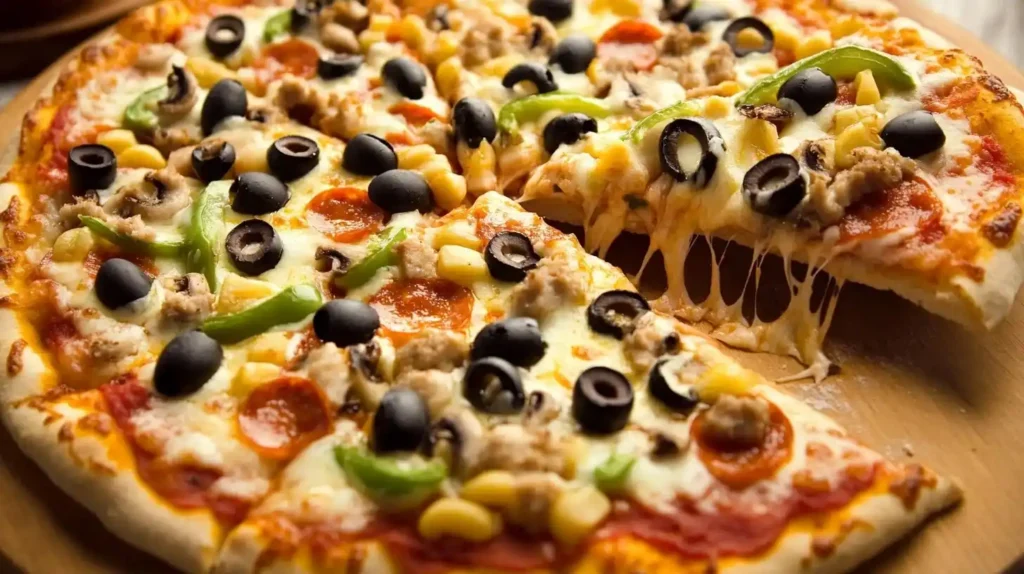Table of Contents
Who doesn’t love pizza? It’s cheesy, flavorful, and downright comforting. But what if you could make a pizza at home that’s even better than takeout? With the right ingredients, tools, and techniques, you can whip up a homemade pizza that’ll impress even the toughest critics. Let’s dive into this ultimate guide to creating a pizza masterpiece, step by step.
Why Homemade Pizza is Better Than Takeout
Making your pizza isn’t just about saving money (though that’s a huge bonus). It’s about customization, freshness, and that unbeatable feeling of creating something delicious from scratch. Here’s why it beats delivery pizza every time:
- Healthier Choices: You control the ingredients. Want less oil? No problem. Prefer whole-grain dough? Go for it.
- Customization: Hate olives? Skip them! Want extra cheese? Pile it on. At home, you’re the pizza boss.
- Cost-Effective: A few basic ingredients can make multiple pizzas, costing way less than takeout.
Homemade pizza also brings people together. It’s not just food; it’s an experience. Whether you’re hosting a DIY pizza night or bonding with your kids over dough kneading, it’s a memory-maker.
Essential Ingredients for Perfect Homemade Pizza
Before diving into the process, let’s talk about the essentials. The right ingredients are the foundation of a perfect pizza. Here’s what you’ll need:

Pizza Dough Ingredients
| Ingredient | Quantity |
|---|---|
| All-purpose flour | 3 ½ cups |
| Warm water (110°F) | 1 ¼ cups |
| Active dry yeast | 2 ¼ tsp (1 packet) |
| Sugar | 1 tsp |
| Salt | 1 tsp |
| Olive oil | 2 tbsp |
Sauce Ingredients
| Ingredient | Quantity |
|---|---|
| Canned crushed tomatoes | 1 cup |
| Olive oil | 1 tbsp |
| Garlic (minced) | 2 cloves |
| Dried oregano | 1 tsp |
| Salt and pepper | To taste |
Toppings (Choose Your Favorites!)
| Topping | Suggestions |
|---|---|
| Cheese | Mozzarella, Parmesan, or Cheddar |
| Meats | Pepperoni, Sausage, or Chicken |
| Veggies | Bell Peppers, Mushrooms, Onions |
| Extras | Fresh Basil, Olives, Pineapple |
Step-by-Step Process for Making Homemade Pizza
1. Preparing the Dough: The Foundation of Your Pizza

The dough is where it all starts, so you’ll want to get this part right. Don’t worry—it’s easier than you think.
- Activate the Yeast:
In a small bowl, combine warm water, sugar, and yeast. Stir gently and let it sit for 5-10 minutes until it’s frothy. If it’s not bubbling, your yeast might be expired. (Pro tip: Think of yeast as the engine of your dough; if it’s not working, the whole thing won’t rise.) - Mix the Dough:
In a large bowl, mix flour and salt. Slowly pour in the yeast mixture and olive oil. Stir until it forms a shaggy dough. - Knead It:
Transfer the dough to a floured surface and knead for about 8-10 minutes. It should feel smooth and slightly sticky—like playdough but softer. - Let It Rise:
Place the dough in an oiled bowl, cover it with a damp towel, and let it rise in a warm place for 1-2 hours until it doubles in size. Patience is key here!
2. Crafting the Perfect Sauce
While your dough is rising, it’s sauce time. The sauce might be simple, but it’s what ties your pizza together.
- Sauté the Garlic:
Heat olive oil in a pan and lightly sauté the minced garlic until it’s golden. - Add the Tomatoes and Seasoning:
Stir in the crushed tomatoes, oregano, salt, and pepper. Simmer for about 10 minutes until it thickens slightly. (Tip: A pinch of sugar can balance the acidity of the tomatoes.) - Blend for Smoothness (Optional):
If you prefer a smooth sauce, give it a quick blend. Otherwise, leave it chunky for a rustic feel.
3. Assembling Your Pizza: Layering for Perfection
Now comes the fun part—putting it all together!
- Preheat Your Oven:
Crank up the heat to 475°F (or as high as your oven allows). If you have a pizza stone, place it in the oven to heat up as well. - Shape the Dough:
Punch down the risen dough and divide it into portions (for one large pizza or two smaller ones). Roll it out into a circle or rectangle, about ¼ inch thick. - Spread the Sauce:
Evenly spread a thin layer of sauce over the dough, leaving about an inch around the edges for the crust. - Add Your Toppings:
Start with cheese, then layer on your chosen toppings. Don’t overload it—less is often more when it comes to pizza.
4. Baking Your Pizza
Use High Heat:
Bake the pizza in the preheated oven for 12-15 minutes. Keep an eye on it; the crust should be golden, and the cheese bubbly.
- Finish with Fresh Additions:
Once it’s out of the oven, consider topping it with fresh basil or a drizzle of olive oil for extra flavor.
Why High Heat Matters
Ever wondered why restaurant pizzas have that perfect crust? It’s the high temperatures of their ovens. While your home oven may not reach 800°F, preheating a pizza stone can help mimic that heat intensity.
Nutrition Facts for Homemade Pizza (Per Slice)
| Nutrient | Amount |
|---|---|
| Calories | ~250 |
| Protein | 10g |
| Carbohydrates | 30g |
| Fat | 8g |
| Fiber | 2g |
| Sodium | 400mg |
Common Problems When Making Homemade Pizza (and How to Fix Them)
Even with the best intentions, things can go wrong. Don’t worry—here’s how to handle some of the most common homemade pizza challenges.
1. Dough That Won’t Rise
This can be frustrating, but it’s usually caused by one of three things: inactive yeast, water that’s too hot or cold, or an environment that’s not warm enough.
Solution:
- Ensure your yeast is fresh. Check the expiration date before starting.
- Use water that’s warm (110°F)—not hot, which can kill the yeast.
- Let the dough rise in a warm spot, like on top of the fridge or inside an oven with the light on.
2. Soggy Crust
No one likes a pizza that feels like a wet sponge. This happens when there’s too much moisture, either from the sauce or the toppings.
Solution:
- Use a thicker sauce or let it simmer longer to reduce excess water.
- Avoid overloading the pizza with watery toppings like fresh tomatoes or mushrooms—cook them first to remove moisture.
- Bake the pizza on a preheated pizza stone or steel to get a crispy crust.
3. Overcooked or Burned Pizza
Burning your pizza can quickly ruin your dinner plans.
Solution:
- Check your pizza frequently during the last few minutes of baking.
- If the crust is browning too quickly, move the pizza to a lower rack.
- Use parchment paper or a lightly floured pizza peel to prevent sticking and burning.
Tools and Equipment for Homemade Pizza Success
Having the right tools can make the difference between a good pizza and a great one. Here are the essentials:
1. Pizza Stone or Steel
A pizza stone or steel helps mimic the high heat of a professional pizza oven, giving you that crispy, evenly baked crust.
- How to Use: Preheat it in your oven for at least 30 minutes before baking.
- Tip: Don’t wash it with soap—just scrape off residue and rinse with water.
2. Pizza Peel
This flat, paddle-like tool makes transferring your pizza to and from the oven a breeze.
- Tip: Dust it with flour or cornmeal to prevent sticking.
3. Rolling Pin or Dough Roller
If you’re not a fan of stretching dough by hand, a rolling pin is your best friend. It ensures even thickness and makes shaping the dough easier.
4. Pizza Cutter
A sharp pizza cutter or wheel ensures clean slices without dragging the toppings.
5. Kitchen Thermometer
To get your dough and oven temperatures just right, a thermometer is essential. Remember, precision is key in baking!
Popular Homemade Pizza Variations You Should Try
Once you’ve nailed the classic margherita, it’s time to get creative. Here are some crowd-pleasing options:
1. Classic Margherita Pizza
Keep it simple with fresh mozzarella, tomato sauce, and basil. It’s proof that sometimes, less is more.
2. Veggie Lovers’ Delight
Pile on bell peppers, onions, mushrooms, and black olives. A sprinkle of feta cheese adds a tangy twist.
3. Meat Feast Pizza
Go big with pepperoni, sausage, bacon, and ham. This one’s for the carnivores out there!
4. BBQ Chicken Pizza
Swap tomato sauce for BBQ sauce, then top with shredded chicken, red onions, and a sprinkle of cilantro.
5. Mediterranean-Inspired Pizza
Use hummus as your base and top with spinach, artichokes, sun-dried tomatoes, and crumbled feta.
Tips for Hosting a Homemade Pizza Night
Homemade pizza isn’t just a meal—it’s an event! Hosting a pizza night is a great way to bring people together. Here’s how to make it memorable:
1. Prep in Advance
- Pre-make the dough and portion it into individual balls.
- Set up a topping station with bowls of cheese, sauces, and various toppings.
2. Create a DIY Pizza Bar
Let your guests assemble their own pizzas. It’s fun, interactive, and ensures everyone gets exactly what they want.
3. Use Label Cards
For toppings, label each ingredient to make it easier for guests to choose (and avoid allergies).
Homemade Pizza Recipes for Different Dietary Needs
Pizza is for everyone! Whether you’re gluten-free, vegan, or following a low-carb diet, there’s a pizza recipe for you.
1. Gluten-Free Pizza Dough
- Swap all-purpose flour for gluten-free flour.
- Add xanthan gum to mimic the elasticity of gluten.
2. Vegan Cheese Pizza
- Use plant-based cheese alternatives, like cashew cheese or nutritional yeast.
- Load up on veggies to make it extra hearty.
3. Low-Carb and Keto Pizza
- Try a cauliflower crust or almond flour dough.
- Skip the sugary sauces and use fresh tomatoes instead.
Storing and Reheating Homemade Pizza
Leftovers? Lucky you! Here’s how to store and reheat your pizza without losing its magic.
1. Proper Storage
- Let the pizza cool completely before storing.
- Place slices in an airtight container, separated by parchment paper to prevent sticking.
2. Reheating Tips
- Oven: Reheat at 375°F for 8-10 minutes for a crispy crust.
- Stovetop: Heat slices in a skillet over medium heat to restore that crunch.
- Microwave: Not ideal, but if you must, place a glass of water in the microwave alongside your slice to prevent it from drying out.
Frequently Asked Questions About Homemade Pizza
1. How Long Does It Take to Make Homemade Pizza?
From start to finish, it typically takes about 2-3 hours, including dough rising time.
2. Can You Freeze Homemade Pizza Dough?
Yes! Portion the dough into balls, wrap them tightly in plastic wrap, and freeze for up to 3 months.
3. What Are the Best Toppings for Kids?
Keep it simple: cheese, pepperoni, and maybe a sprinkle of veggies like bell peppers or mushrooms.
Conclusion: Mastering the Art of Homemade Pizza
Making pizza at home is more than a recipe—it’s a journey. From perfecting your dough to experimenting with toppings, every step is a chance to learn and get creative. So, roll up your sleeves, grab your rolling pin, and get ready to create the best pizza you’ve ever tasted. It’s time to turn your kitchen into a pizzeria!
Explore More Recipes Similar to Homemade Pizza
If you love making Homemade Pizza, you might enjoy these delicious and easy-to-make recipes that share similar flavors, ingredients, or cooking styles:
- Baked Ziti – A cheesy, comforting Italian dish with layers of pasta, sauce, and melted cheese.
- Crescent Roll Veggie Pizza – A quick and delicious twist on pizza, using crescent rolls as the base.
- One-Pot Taco Pasta – A fusion of taco flavors and pasta, perfect for a hearty meal.
- Creamy Mushroom and Spinach Stuffed Chicken – A rich and flavorful dish featuring a creamy filling similar to pizza toppings.
- Lemon Butter Garlic Shrimp Pasta – A fresh and zesty seafood pasta dish with Italian flavors.
- Homemade Crunchwrap Supreme – A fun and crispy Tex-Mex alternative to pizza with layers of cheese, meat, and tortillas.
Try these recipes and enjoy new flavors while keeping the essence of a homemade, comforting meal! 🍕✨

